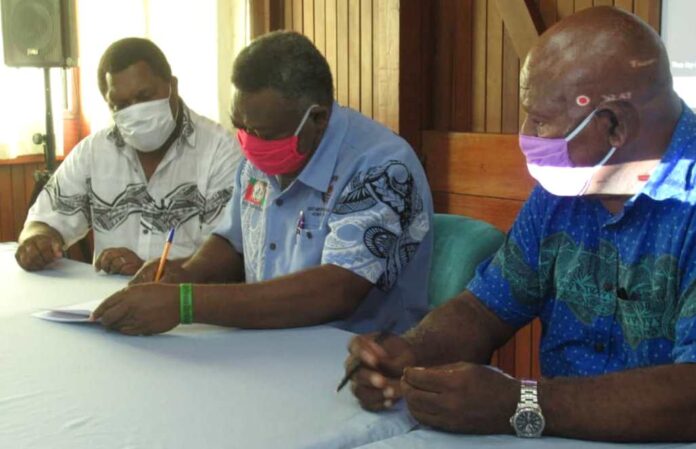
WITH the high prevalence of Family and Sexual Violence (FSV) in East New Britain, it has established an interagency Family and Sexual Violence Response Protocols and referral guidelines.
A significant signing occasion of the protocol took place last week between Provincial Deputy Administrator Social Service Levi Mano, Provincial Police Commander Joseph Tabali and senior Provincial Magistrate Samuel Lavutul.
East New Britain Family Sexual Violence Action Committee (FSVAC) assisted by Child Fund and Consultative Implementation and Monitoring Council (CIMC) developed the protocols and referral guidelines for the development of a referral pathway and execution to support survivors of Gender Based Violence (GBV).
Mr Mano who is also the FSVAC chairman said the protocols will act as a guide to the secretariat to establish appropriate pathways. It will strengthen and formalize the response to FSV in the province and will be used by all key agencies responding to FSV who have undergone training.
“GBV has attracted much attention in the last three decades both from the country’s development policy makers and international development partners,” he said.
ENB established its own provincial FSVAC to respond to the national government’s policy to address GBV, indicating the province’s willingness and its leaders to address GBV issues.
East New Britain (ENB) province Interagency Family and Sexual Violence response protocol has been endorsed by the following agencies, ENB Provincial Administration, ENB Police, ENB Courts, ENB Provincial Health Authority and ENB Division of Community Development.
The agencies and provincial administration have acknowledged the CIMC FSVAC and Child Fund PNG for their partnership and support in developing the protocols and the New Zealand Aid programme.
Plans are in place to do more awareness in the districts and LLGs and to further train people on referral pathways.
